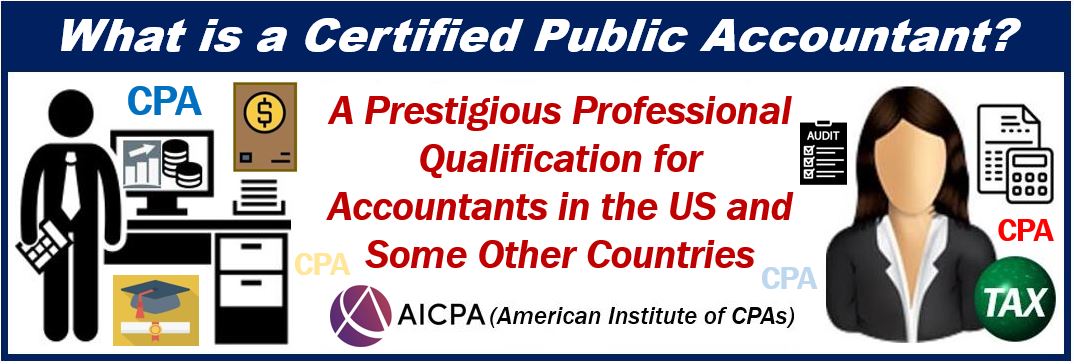A CPA or Certified Public Accountant is the most highly qualified professional in the world of accountancy in the United States and several other English-speaking countries. CPAs have the authority to perform certain activities in their field that other non-certified accountants do not have.
It is the equivalent of Chartered Accountant in the UK, Ireland, Australia, and several other Commonwealth countries.

A certified public accountant has a license to provide accounting services to individuals, companies, associations, and other entities. In the United States, each state awards its own license which allows professionals to practice in that territory.
The AICPA (American Institute of CPAs) says the following:
“A CPA, or Certified Public Accountant, is a trusted financial advisor who helps individuals, businesses, and other organizations plan and reach their financial goals.”
“Whatever those goals-saving for a new home, opening a new office, or planning a multi-billion dollar merger-CPAs can help.”
CPA vs. accountant
People often use the two terms with the same meaning. However, there is a difference. Any person who works in the field of accountancy is an accountant.
All certified public accountants are accountants, however, it is not the case the other way around, i.e., not all accountants are CPAs. Certified Public Accountants have considerably more experience, career opportunities, and academic training and qualifications than their non-certified counterparts. They have met specific education and state licensing requirements and have also sat and passed the CPA exam.
Capella University lays out the following differences:
“Many businesses that are required to have a financial statement audit or review will need a CPA to perform these services and issue the required reports.”
“In addition, CPAs are considered fiduciaries with a legal duty and power to act on behalf of, and in the best interest of, their clients. Non-CPA accountants are not considered to be fiduciaries to their clients.”
Becoming a CPA
At first, you must complete an accounting study program at university/college. According to AICPA, students should complete 150+ semester hours of college assignments (homework).
You should then do the Uniform CPA Exam. AICPA develops the exam and grades participants. However, eligibility to do the exam is decided by each state’s board of accountancy.
You will receive your Certified Public Accountant certificate if you pass the exam. It does not, on its own, give you the authority to practice. Each state has its own requirements regarding additional work experience and academic qualifications.
Career opportunities
Certified public accountants have the best career opportunities in their field. Every business or organization needs the knowledge and skills of a CPA. It is a highly regarded designation.
A qualified CPA typically works in corporate accounting (business/industry), public accounting, not-for-profit organizations, or education.
When a business’ financial situation is complex, having a certified public accountant on board will help significantly. Their presence will make it much easier for senior management to determine what to do next.
Apart from being experts in accounting, these professionals also have a comprehensive understanding of business and finance. They must also learn to be flexible so that the services they provide can match their clients’ needs.
